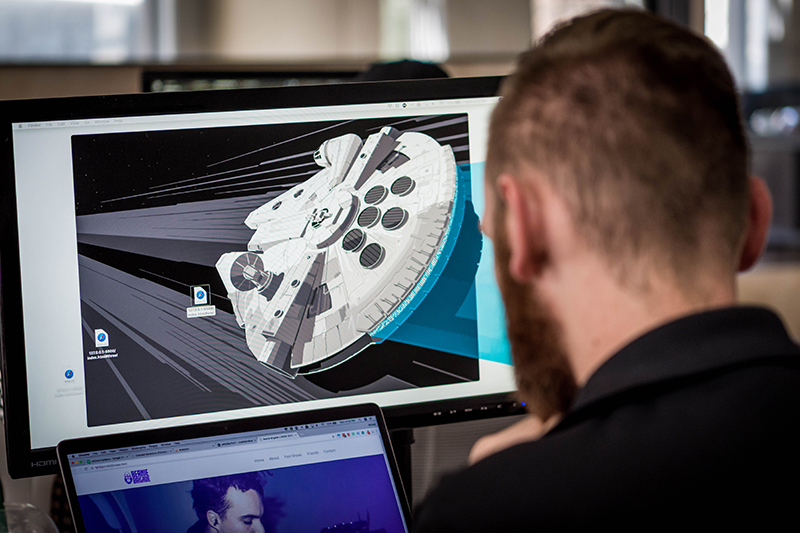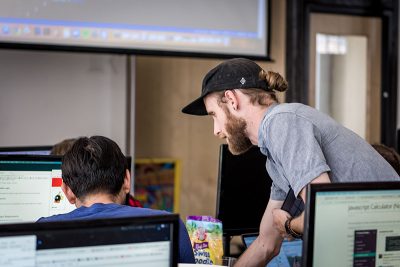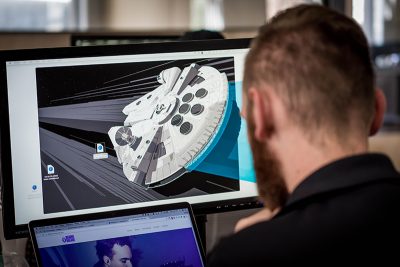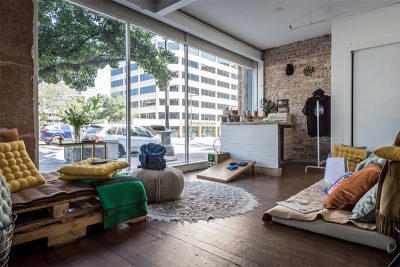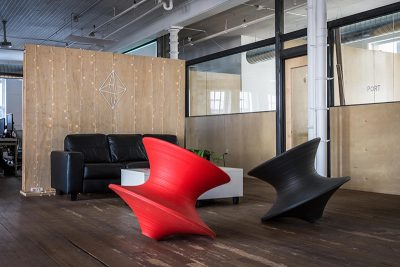V School Bringing Opportunity to Salt Lake City
SLUGmag
V School is a tech-education boot camp teaching industry-celebrated curriculum, and has been since its start back in 2013. The school offers lessons in coding, UX and UI design, Experience Design, Data Science, Big Data, Machine Learning and Project Management, as well as other skills that are hand-selected by the school’s board. The board is made up of industry professionals advising in what skills are needed and sought after in an effort to give its students a “Super Transcript.”
V School’s partnership with Adobe is a catalyst for Salt Lake City’s Adobe Digital Academy that offers diverse students the experience and education they need for a career in web development. It’s easy to see what makes their transcript and curriculum unlike anything else available from an academic boot camp. V School is also taking strides toward increasing tech inclusion in Salt Lake City by partnering with SLUG Magazine in the form of a full-ride design scholarship for their Oct. 16 fall session.
I was given the opportunity to check out V School in person, and at first, I didn’t know what to expect—I had seen and heard of academic boot camps before, but I didn’t know that something like this was out there. I walked up to 150 S. State St. at 5:30 p.m. on a Monday. The building was bustling with folks from all different startups and students who share the building space.
As I walked in, my eyes immediately caught a front office, colorful in its decoration and looking as if it could double as a meditation room with its comfy, low ceiling and atmospheric music pumping through the enclosing glass. When I walked up to the room, I was greeted by Mo Reeder, the V School co-founder who enthusiastically welcomed me with a handshake and the offering of a beer (always a good way to welcome me).
I was given a tour of the campus. The first floor is a wide-open space with two floors and about 30 different businesses and startups intermixed with classrooms and a common space where everyone in the space can intermingle, share ideas and network with each other. We walked over to the elevator and took it up to the third floor to see more classrooms and campus space. As we entered the third floor, the atmosphere was calmer than the main floor, with more traditional-style classrooms. As we entered one, I was welcomed by four students relaxing after class with a game of ping-pong in a lounge area that separated the main hall from the classroom. They showed me a class in a session that was working out of an open workspace meant to create a space of collaboration, much like many modern offices and ones like that board work out of. Our last stop on the tour was the fifth floor, a massive open area still under construction, being built to have a state-of-the-art kitchen for students so they may have access to a meal, a teacher’s lounge and a podcast studio.
After seeing this beautiful setting—inside a historic, no less—building and hearing of the plans of the future, I went back downstairs and sat down with Reeder to talk about them, how it started, what it stands for, what it offers and where it is going.
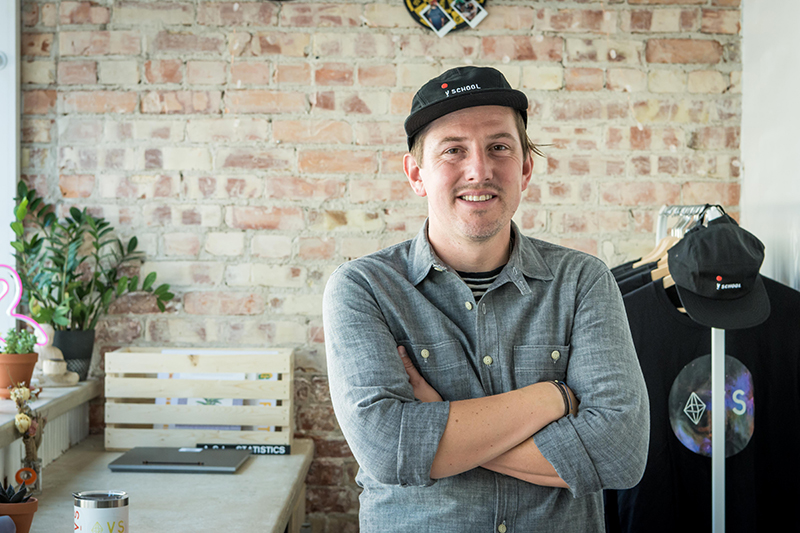
SLUG: What is your background in coding and with modern tech in terms of teaching?
V School: Between Co-Founder Michael Zaro and I, we have 25 years’ experience in alternative education. Before starting this and working with Dev Camps, I was working at UCLA until my wife introduced me to an opportunity to come out to Provo, where I ended up working with Dev Mountain and General Assembly. V School was born out of a dev shop in 2013, out of a want to offer education to students for the right reasons.V School was the first coworking space in the state of Utah.
SLUG: In creating such a unique and first-of-its-kind way to learn in the state of Utah, who makes up your student body?
V School: We currently have about 200 students, 50 percent from Utah and the other 50 percent come from all over. Zorrow has also outreached and taught coding to people not just on campus through work with people in Afghanistan, Bulgaria, Indonesia and Syrian refugees.
SLUG: What led you to work with refugees?
V School: While working over in Kuwait, we had a contact through BYU that was able to link us with a university in Beirut that, in turn, gave us an opportunity to teach coding to people who had fled from Syria. We wanted to provide them with a skill that would be universal and could help them get a job no matter where they went. A lot of people who leave their home country may not have the money or opportunity to pursue their past careers—and with coding, they could have a skill that could set them up for a new career. Here in Utah, we’ve partnered with Adobe, Cotopaxi, Goldman Sachs and the University of Utah to focus on the refugee needs in our home state.
SLUG: This mentality of looking out for others seeking an education isn’t new as V School offers a lot to help students overcome hurdles that may hinder their education.
V School: Yes! V School’s mission is to provide a one of a kind education to those who are serious about achieving it. [Free student housing, UTA transit and Macbook rentals are offered to students.] V School only accepts about 11 percent of applicants, and that is after interviewing with them and testing them.
SLUG: Eleven percent? Wow, so you are like the Ivy League of boot camps?
V School: Exactly, and with that, we take care of the students we accept by providing free housing for them and giving them a space with their peers where they can collaborate, as well as provide free transportation, laptop rentals and our new kitchen meals so that students who may not have the best financial situations or transportation situations don’t have to worry while they pursue their education. This is all on top of that we don’t expect you to pay us back for your education until you have a job and can afford to do so, [a job making at least 50k a year].
SLUG: What is V School’s relationship with Adobe?
V School: Adobe is committed to us as a school and hiring our students after they graduate because of their prestige, passion and diversity. This commitment shows through Adobe investing in our students and mentoring them, so once they graduate, they can be hired by Adobe. It goes to show that you don’t need a four-year degree to get these kinds of opportunities.
SLUG: Where do you see V School in five years?
V School: [Our] curriculum is fast, but [our advisors] watch to see what top companies are looking for when hiring and what needs are out there in the tech industry. We want to eventually introduce programs working with VR, ARG and digital marketing. We are always testing new programs well in advance before their introduction. It’s important not to fly by the moment. Tech is here to stay, and it’s important to spin out quality grads to power the next wave of people in tech.
A note from SLUG: SLUG Jumper, our co-created scholarship with V School, is a full-ride opportunity to learn Experience Design (XD) at no expense. One deserving recipient will receive the chance to learn design at V School’s downtown Salt Lake City Campus beginning Oct. 16. More information about the course and important dates about the scholarship at vschool.io/slug-magazine-scholarship.
With that, I said my goodbyes and left V School. As I walked out, three kids rode past me on GREENBikes, one wearing a V School–branded hat. It seemed almost too serendipitous to be real, but it also spoke to the reach V School has on downtown Salt Lake City as it beefs up its campus and student body. After not knowing what to expect, then talking with Reeder and seeing the campus, there is something genuine about it.
If you want to check out V School for yourself, I recommend going to their website or just heading over to 150 S. State St. and seeing it for yourself. For more information, go to vschool.io.
